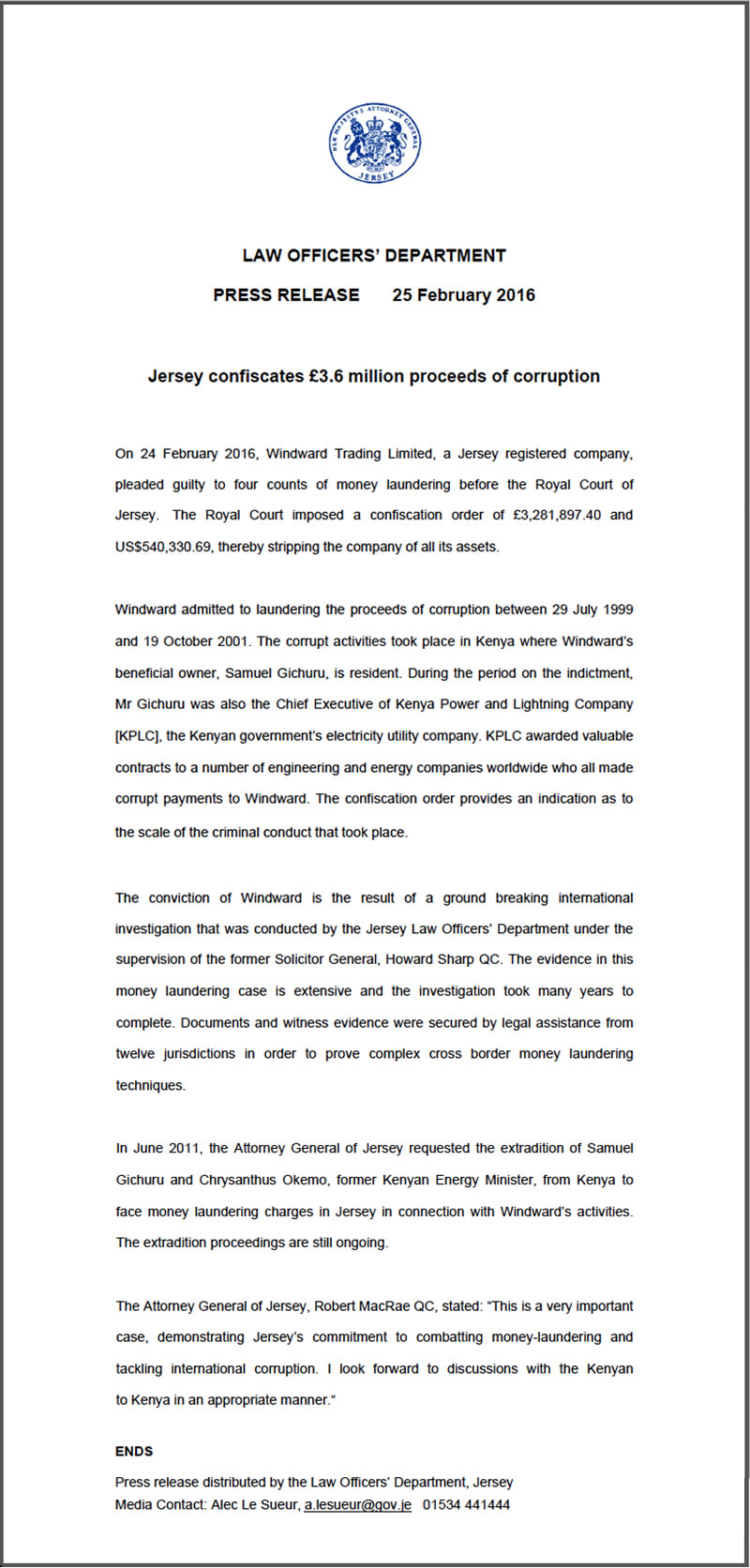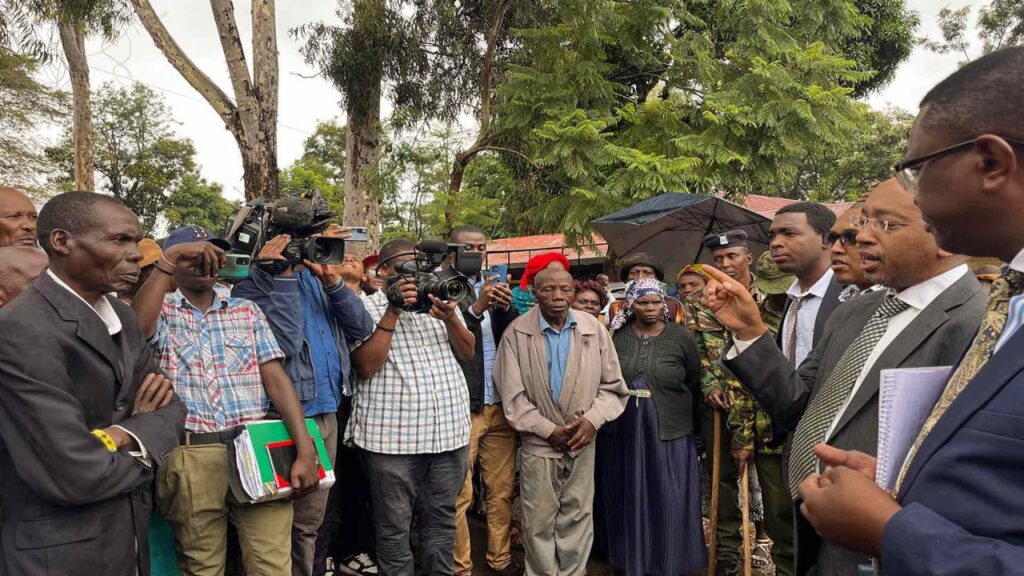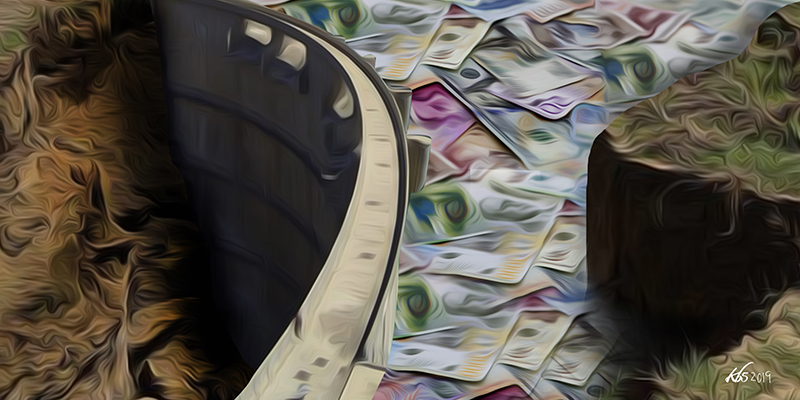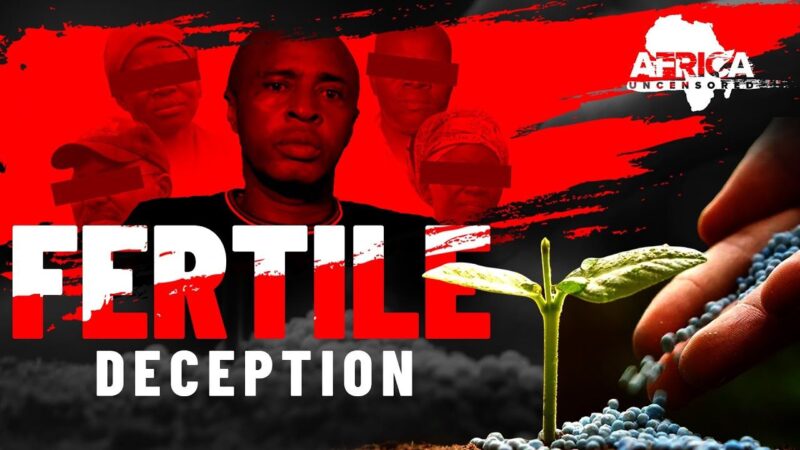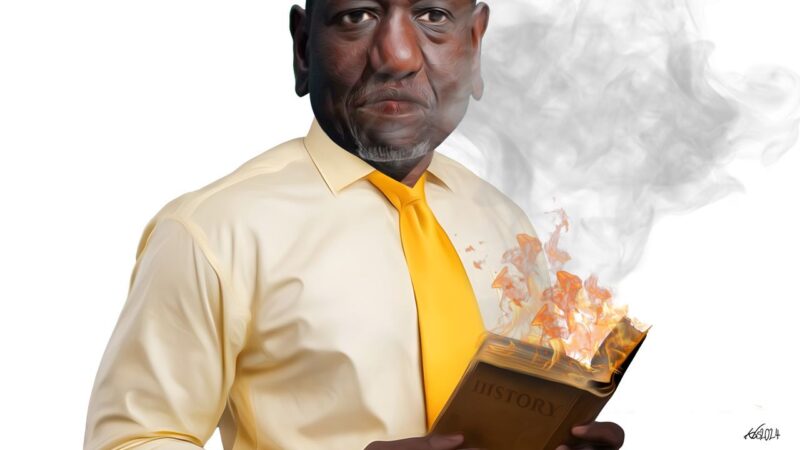Look to Windward Trading, Who Looted Half a Billion
Two events of momentous proportions took place in Kenya since the beginning of this year.
On January 30, sons of the slain drug lord Ibrahim Akasha, Baktash Akasha and Ibrahim Akasha, Indian drug suspect Vijaygiri Goswami and Gulam Hussien, a Pakistan, were extradited to the US to face charges of drug trafficking. Since 2014, the Akashas had been fighting not to be deported to the US.
In March 2015, the four were arrested with 98 packets of suspected heroin. The US then issued an Interpol “red notice” for their capture and request for extradition. The Manhattan District Attorney said of the quartet when they arrived in New York: “Kenya drug trafficking organization with global ambitions”.
On March 3, 2017, a meeting quietly took place at the Treasury Building in Nairobi between National Treasury Permanent Secretary Kamau Thugge and Senator Ian Gorst from Jersey Island. The two officials representing their respective countries were concluding an agreement that finally returned money that had been stashed in the tax haven island.
Jersey had just returned Ksh380 million ($3.8 million), part of Ksh500 million ($5 million) that had been stolen by two senior Kenyan state bureaucrats in 2011 and hidden in the island’s banks, known for their secrecy and lax tax laws.
A former chairman of the rich and influential parastatal, Kenya Power and Lighting Company (KLPC), Samuel Gichuru and a former minister of energy, Chris Okemo, had conspired to loot public money, which they then expatriated to the tax haven. As is normal with such conspiratorial and illicit transactions, Gichuru formed a ‘phantom’ company, Windward Trading Ltd, that was then used to siphon out the Ksh500 million.
In June 2011, Jersey’s Attorney General requested the extradition of the two, and the United Kingdom, under whose jurisdiction the island falls, issued an arrest warrant. In February 2016, the Royal Court of Jersey finally confiscated the stashed money after the company pleaded guilty to four charges of laundering corrupt money.
Even though the money has been repatriated, the extradition case is still going on and the remaining Ksh120 million was retained to cover transactional charges incurred by the Jersey government.
In a country like Kenya, where state corruption is rife, money stolen from the public coffers by powerful civil servants and those close to power, invariably ends up stashed in foreign offshore accounts
The case illustrates how illicitly acquired money is hidden, transferred and invested in foreign banks through a labyrinthine maze of electronic transfers. Identical mechanisms, including dummy companies, are also used by companies and individuals to hide income from tax authorities in the countries where it is earned and to transfer it to low-tax jurisdictions. Through such illicit financial flows (IFFs), Africa loses, according to the Tax Justice Network-Africa, the equivalent of $10 for every $1 it receives in aid.
In 2016, the Panama Papers, the world’s biggest data leak, provided a glimpse into the scale of the problem. Briefly, the Panama Papers refer to 11.5 million data files leaked from the Panama-based law firm, Mossack Fonseca, the world’s fourth largest offshore law firm. The leak named individuals who included presidents, influential politicians, powerful bureaucrats and companies that use the law firm as a registering agent to channel their — oftentimes illegally acquired — money to jurisdictions with secretive and lenient tax laws. The files traced 191 individuals and 25 companies to Kenya.
“IFF is a generic term,” says Jared Maranga of Tax Justice Network-Africa (TJN-A), a pan- Africa research and advocacy organisation based in Nairobi. Maranga is an investments and tax policy expert. He says the terminology depends on the form and nature of how the money is being moved. ‘Generally speaking, there are three ways in which IFFs are facilitated: through state corruption, bilateral and multilateral treaties and tax incentives.’
The Washington DC research and advocacy group Global Financial Integrity defines IFFs as illegal movements of money or capital from one country to another. This movement of money is what is classified as ‘illicit flow’ — especially when the money is illegally earned, transferred, or used.
The advocacy group says IFFs originate from three main sources: commercial engagements — through tax evasion, inflating and manipulation of prices of goods; criminal activities such as drug and human trafficking, illegal arms trade and smuggling of contraband; and corruption by influential and powerful state officials.
Importers whose aim is to dodge paying tax use underhand tactics such as inflating the price of goods to evade or undercut Custom duties, VAT or income tax. Crime syndicates launder their illicit profits by mixing them with legal money earned from legitimate business such as buying and selling of used cars, for example. Bureaucrats create fake companies to transfer dirty or stolen money to a bank account in a foreign country. Huge sums of cash are also ferried across the border by human traffickers with the aim of depositing the money in a foreign country.
In a country like Kenya, where state corruption is rife, money stolen from the public coffers by powerful civil servants and those close to power, invariably ends up stashed in foreign offshore accounts. As a way of ‘cleaning’ it, the cash is used to buy real estate in developed countries in Europe and the Americas or invested in legitimate businesses through buying shares in multinational companies. In 2004, a report by report by the international risk consultancy Kroll commissioned by the Mwai Kibaki administration identified over Ksh130 billion ($1.3 billion) that relatives and associates of former President Daniel arap Moi had hidden in nearly 30 countries using a web of shell companies, secret trusts and frontmen.
IFFs have also provided drug barons with devious ways of moving their money without being detected. If the drugs trade itself is a dangerous and risky business, laundering the proceeds, which run into billions of shillings, is even a riskier undertaking.
In Kenya, drug lords have over time used both traditional and innovative means to hide and move their cash without attracting undue attention. And in situations where they cannot avoid detection, they have employed the time-tested methods of arm-twisting, bribery and coercion.
All the Major Banks Have Been Involved in Hiding Drugs Money
According to a 2009 report by the Financial Transactions and Reports Analysis Centre of Canada, drug traffickers launder approximately $100 million per year through the Kenyan financial system. ‘I’ll tell you this as a matter of fact,’ says Anselm Mbogo, a retired forensic auditor and banking fraud investigator, who in the course of a three-decade career worked in nearly every big local and international bank in Kenya. ‘All the major banks in Kenya have at one time or the other been involved in hiding or moving drugs money.’ Today, as a forensic consultant, his clients include some of his former employers. ‘The banks are still susceptible to money laundering by the drug lords,’ he says. ‘[That’s] basically because the drug barons have perfected the art of circumventing the 2012 Central Bank of Kenya (CBK) laws on money laundering and because bankers, just like any other human beings. are vulnerable to bribery and corruption.’
In a move to curb money laundering the CBK decreed that no more than $10,000 (Ksh1 million) could be deposited in a single transaction. It also developed regulations requiring banks to know their customers and their customers’ sources of funds, and to report any suspicious transactions.
Drug barons are attracted to heavy cash retail businesses, which move money on a daily basis. Retail businesses such as supermarket chains, matatus, pubs, are easy targets for cleaning illegal money because customers pay in cash
Laundering by banking officials is neither new nor is it about to end. ‘Four years ago, HSBC, a banking institution based in London, got into big trouble after it was found to have facilitated drugs money from Mexico,’ says Mbogo. HSBC bank was accused by the US federal banking authority of clearing suspicious travellers’ cheques worth of billions of dollars.
A Dynamic Three-Stage Process
Money-laundering is a dynamic three-stage process. The three stages are usually referred to as placement, layering and integration. Placement involves introducing the dirty cash into the financial system, perhaps mingling it with ‘clean’ funds to create an aura of legitimacy. Layering involves attempts to distance the money from its illegal source through layers of financial transactions. Integration makes the money available to the criminal as proceeds of legitimate commerce such as purchase of shares in business or investment in luxury goods and real estate.
Because illicit money generated from the drug business has to be infused into the financial system, it involves an intricate web of people and movement to ensure no paper trail is left behind. First, the money is ‘broken up’ into different amounts, even in different currencies, then moved around different accounts, to effectively obscure the audit trail. Once this is successfully done, the owner can access his clean money.
‘A couple of years ago. if you recall, a new entrant into Nairobi politics, inadvertently boasted that he ran 200 bank accounts,’ says Mbogo. ‘Just ask yourself, why would a person need 200 accounts, never mind the only business he was known to be engaged in was running some matatus in the city?’
According to Mbogo’s banking fraud investigations in Kenya, secondhand car bazaars and real estate construction businesses are the closest we have to drug money being laundered. ‘Let’s put it this way, drug barons are attracted to heavy cash retail businesses, that move money on a daily basis,’ says Mbogo. ‘Retail businesses such as supermarket chains, investing in the running of matatus, running a pub business, are easy targets for cleaning illegal money because customers pay in cash; hence it is easy to create fake transactions and receipts, which are reported as business sales when depositing cash on a daily basis.’
A big time building materials hardware company does not have to receive “illegal” money directly from a drug baron. All it needs to do is ask the property developer, in this case the money launderer, to deposit the money into a certain account
Big time supermarkets chains deliver huge volumes of cash, sometimes 4-5 time a day to banks. ‘The banks, in all fairness, cannot suspect that some of this money could be from illicit drug profiteering. On a good day, the biggest supermarket chain in Kenya deposits anything between Ksh30 million and Ksh50 million,’ says Mbogo. ‘The same applies to the matatu industry and bar owners. They deposit money on a daily basis, oftentimes 2 to 3 times depending on the briskness of the business.’
Eliud Njoroge, one of the few hedge fund managers in the country, says supermarket stocks are a good investment for drug kingpins. ‘They will identify a popular and fast growing supermarket chain and buy into it by way of stocks, which are in hundreds of millions of shillings. The yearly dividends that accrue, will be clean money, never mind the dirty money that was injected into the business through buying its shares.’
The forensic auditor avers that the proliferation of car bazaars in Nairobi coincided with the increased drug trade in this part of the world, when the Indian Ocean littoral was identified as an important ‘unmanned’ route. In the secondhand car businesses, you can claim to be banking money every day from fake car sales. With the setting up of a legitimate motor car business as a front company, the drug money is infused into the financial system legally through the opening of multiple accounts that handle money accrued from sales.
The other popular way that illicit drug money has been injected into the financial system is through the property development projects. ‘Just like the proliferation of secondhand car marts, it is also not a coincidence that the boom in the real estate industry has taken place in the past couple of years,’ observes Mbogo.
Like a supermarket, real estate development is a heavy cash business that involves employing casual labourers who are paid daily, or sometimes weekly. It also involves the buying and hiring of expensive heavy machinery (not on a daily business though), and building materials on a daily basis. ‘The construction business is favoured by drug barons because it facilitates what we call trading in goods,’ says the forensic auditor.
‘A big time building materials hardware company does not have to receive “illegal” money directly from a drug baron. All it needs to do is ask the property developer, in this case the money launderer, to deposit the money into a certain account. Once that is done, he can then go to the hardware shop and be given all the materials he has paid for. There is no money exchange, but there is value for money, which leaves no paper trail.’
The introduction of mobile money 10 years ago was a blessing to the drug barons, says Mbogo. The barons today have maximised the use of M-Pesa, Safaricom’s mobile money transfer innovation that mainly targeted Kenyans who did not have banking facilitates. There are 60,000 plus M-Pesa agents countrywide, as opposed to 840 bank branches in the country.
Today, a simple e-mail sent from Swindon, southeast London by a Kenyan living in the UK, to a fellow Kenyan in Nairobi can facilitate the moving of millions of shillings without actual movement of the money itself
‘Just like trading in goods to exchange value for cash, customers who use M-Pesa exchange cash for virtual value that goes into their phone. This allows them to buy goods, transfer money and even receive credit. Drug barons nowadays are moving huge amounts of money through M-Pesa in multiple credit lines, which allows them to even withdraw the money in another country. ‘Mobile transactions are made through text messages and therefore are difficult to trace,’ says Mbogo.
Safaricom, the company that runs the M-Pesa banking facility, recently said since 2016, Kenyans have been moving on average Ksh16 billion ($160 million) a day. The maximum amount one can transfer in a single transaction is Ksh140,000 ($1,400). ‘Let’s assume a drug lord operates or has access to upward of 10 mobile phone lines. He is capable of moving Ksh140,000 in all these credit lines, every day, every week, every month, several times over. In a year, he will have moved a humungous amount of money, running into hundreds of millions of shillings, without raising an eyebrow from the concerned authorities,’ explains Mbogo.
And There’s Always Been Hawala
One of the oldest forms of sending and transferring money without moving the money itself, Hawala, an Indian concept used in many centuries, is still as attractive to drug barons as it is to people who either do not have bank accounts or want to avoid the banking system altogether. ‘Today, a simple e-mail sent from Swindon, southeast London by a Kenyan living in the UK, to a fellow Kenyan in Nairobi can facilitate the moving of millions of shillings without actual movement of the money itself.’ Mbogo says he once traced an e-mail correspondence between the UK and Nairobi’s River Road that talked of money transfer. ‘The system works on trust, there is no paper work, the e-mail is written in coded language, you’d have to be knowledgeable in the language to know what’s being talked about.’
The really bold drug barons will set up their own banks to avoid all the hassle of bribing the numerous people from the police to banking officials; dodging the tedious procedures and the obvious scrutiny from government bureaucrats. ‘In this county, we have had such banks, some OF whose operations have been suspended, but I can tell you as night follows day, the banks are still very much in operation,’ says Mbogo.
Right of reply

Attachment:
